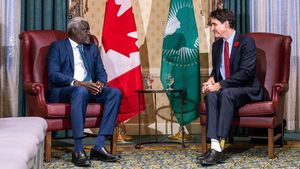At least 73 individuals have tragically died from mysterious causes in the Sudanese town of al-Hilaliya, which has been under siege by the paramilitary group known as the Rapid Support Forces (RSF). This alarming trend was reported by the Sudanese Doctors Union on Wednesday, raising serious concerns not only about the health crisis but also about the political instability gripping the region.
Al-Hilaliya, located within eastern El Gezira state, is one of many villages facing dire circumstances since the defection of a prominent RSF commander to the Sudanese army. This betrayal has prompted devastating revenge attacks, displacing over 135,000 people from their homes. The brutal conflict between these armed factions has evolved to become the world's largest humanitarian crisis, resulting in the displacement of more than 11 million individuals and exacerbated hunger issues.
While the death tolls have frequently been linked to RSF shelling and gunfire, residents of al-Hilaliya have faced different foes: they are becoming ill with severe diarrhea, which has caused local hospitals to become overwhelmed. A report from three residents indicated this outbreak, which might be symptomatic of broader healthcare issues embedded within the siege.
The situation is compounded by the RSF's enforcement of network blackouts, which has hindered efforts to ascertain the exact cause of these mysterious illnesses. With communication severely restricted, many residents have been left without access to timely medical information or assistance. One bereaved man described the exhausting heartbreak of losing three family members to the same affliction—he only learned of their passing after others fled the town to find areas with internet access.
Access to leave al-Hilaliya has become increasingly difficult; those desperate enough to attempt escape are required to pay exorbitant fees at RSF checkpoints. This financial burden only adds to the already dire conditions faced by the residents. According to pro-democracy activists, the siege of al-Hilaliya began on October 29, when RSF fighters assaulted the town, resulting in casualties and forcing civilians to seek refuge within three mosques.
Al-Hilaliya is notable for being home to the family of defected RSF commander Abuagla Keikal. Locals speculate this connection could have led to the town's unexpected siege, which has led to the monopolization of the area—historically considered a stable trade hub for around 50,000 individuals, many of whom were already displaced from other conflict zones.
Eyewitness accounts suggest devastation beyond the killings. Reports reveal theft and looting of the town's markets and warehouses during the RSF's occupation, depriving the remaining residents of necessary resources and food supplies. The humanitarian impact of these actions is severe, as satellite imagery from the Yale Humanitarian Lab shows alarming evidence of growing cemeteries throughout various towns within Gezira since these revenge attacks began.
This imagery also highlights the destruction of agricultural fields, particularly noted in the village of Azrag. With the RSF's tactics remaining brutal and uncompromising, the combination of military violence, healthcare collapse, and food scarcity has resulted not just in immediate deaths but has also implied long-term consequences for the area's wellness and survival.
The rising rate of illness among residents and lack of communication is being closely monitored, as the death toll continues to climb amid chaos. Caring professionals warn of the compounded effects of malnutrition and untreated medical conditions, indicating the health crisis is likely to extend well beyond the current wave of illnesses affecting al-Hilaliya.
The international community watches with bated breath as the violent storm of conflict continues to rage unchecked. The happenings within al-Hilaliya reflect not merely local issues but resonate within the grand narrative of Sudanese society grappling with years of unrest and disorder. Aid organizations operating within the area are being led to rethink their strategies for providing assistance, taking note of the increasingly dangerous political and logistical contexts fueled by RSF's actions.
That said, thoughts turn toward how far-reaching these events will reverberate through the community and the broader Middle East. Potential consequences of sustained violence could see not only health crises growing exponentially but might also push more people toward other areas, sparking new tensions or conflicts.
The testing times push the resilience of local communities to their limits. The intertwined stories of loss, conflict, and survival showcased within al-Hilaliya cast shadows threatening humanitarian support and longer-term peace. The moving tales of loss and sorrow continue to aggregate, demanding immediate attention to stem the tide of suffering.”



